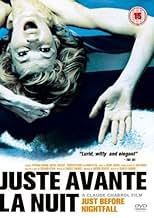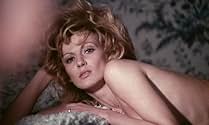IMDb-BEWERTUNG
7,2/10
2386
IHRE BEWERTUNG
Charles Masson, ein Werbefachmann, hat eine Affäre mit Laura, der Frau seines besten Freundes, des Architekten François Tellier. Charles erwürgt Laura, als eines ihrer SM-Spiele zu weit geht... Alles lesenCharles Masson, ein Werbefachmann, hat eine Affäre mit Laura, der Frau seines besten Freundes, des Architekten François Tellier. Charles erwürgt Laura, als eines ihrer SM-Spiele zu weit geht.Charles Masson, ein Werbefachmann, hat eine Affäre mit Laura, der Frau seines besten Freundes, des Architekten François Tellier. Charles erwürgt Laura, als eines ihrer SM-Spiele zu weit geht.
- Regie
- Drehbuch
- Hauptbesetzung
- 1 BAFTA Award gewonnen
- 1 Gewinn & 1 Nominierung insgesamt
Clelia Matania
- Mme Masson
- (as Clélia Matania)
Empfohlene Bewertungen
This is the most morally exquisite of Chabrol's many explorations of the human condition. Guilt, forgiveness, revenge coexist and mutually triumph. Many of us assume these three moral stances are mutually incompatible. Chabrol balances them against each other and then fuses them together. The actors reveal their inner dilemmas with gestures more than words. Deep intentions run across surface motives. And the final gesture of this compelling film casts all that went before into another, deeper level. Of course, no deed is as simple as it seems. But few appreciate as Chabrol does here that our all too common morally mixed motives can continue to coexist to the grave. No evil deed is ever straightforward, but neither are the best ones.
Had Chabrol filmed this in the style of Bergman, this film would be a Criterion Classic. But filmed as a thriller, it has sadly failed to gain the audience and admiration it so richly deserves. It is a philosophical triumph!
Had Chabrol filmed this in the style of Bergman, this film would be a Criterion Classic. But filmed as a thriller, it has sadly failed to gain the audience and admiration it so richly deserves. It is a philosophical triumph!
Though coming from Chabrol's major phase (1967-1975), this was only recently released on DVD – and exclusively on R2 at that!; still, I had missed an incongruous Saturday morning broadcast of the film on Italian TV several years back. Ironically, even if it can lay a claim to being among the director's best-regarded efforts, I admit to having found such lesser-known Chabrol titles as DEATH RITE (1976) and ALICE OR THE LAST ESCAPADE (1977) – both of which immediately preceded this viewing – more readily satisfying
though the fact that JUST BEFORE NIGHTFALL treads typically bourgeois i.e. inherently mundane territory, whereas the others were fanciful (thus essentially lightweight), may have had more to do with this than anything else!
Actually, my main quibble with the film is its overlength (due to the protagonist's wallowing in self-pity, this being basically an update of Dostoyevsky's literary classic "Crime And Punishment", during the last act); in a way, it is also a reversal of Chabrol's own LA FEMME INFIDELE (1969), with the very same stars (Michel Bouquet and Stephane Audran) no less. In the latter she is initially oblivious – and eventually forgiving – of his having learnt about her infidelity and murdered the other man, while here it is he who has a clandestine affair, kills the woman concerned and then confesses to both the wife and his best friend (husband of the deceased and played by Francois Perier), both of whom try to convince the guilt-stricken hero thereafter not to give himself up to the Police (she even taking extreme measures to this end)! Audran, still at the height of her statuesque beauty, is a particular delight and she went on to win a BAFTA award for it (shared for the actress' famously unruffled turn in that Luis Bunuel masterpiece THE DISCREET CHARM OF THE BOURGEOISIE [1972]).
A subplot, then, depicts a comparable folly to the protagonist's – where the elderly and meek-looking cashier in Bouquet's firm embezzles funds to sustain his unlikely romance with a much younger woman (not that the perennially exhausted hero bore the looks of a Casanova himself but, at least, his sluttish mistress is clearly shown to be into sado-masochism). Ultimately, such ironic yet provocative (indeed quasi-surrealist) psychological nuances, are what make Chabrol's work so intriguing and quietly rewarding – more so, in fact, than perhaps any other of the "Nouvelle Vague" film-makers.
Actually, my main quibble with the film is its overlength (due to the protagonist's wallowing in self-pity, this being basically an update of Dostoyevsky's literary classic "Crime And Punishment", during the last act); in a way, it is also a reversal of Chabrol's own LA FEMME INFIDELE (1969), with the very same stars (Michel Bouquet and Stephane Audran) no less. In the latter she is initially oblivious – and eventually forgiving – of his having learnt about her infidelity and murdered the other man, while here it is he who has a clandestine affair, kills the woman concerned and then confesses to both the wife and his best friend (husband of the deceased and played by Francois Perier), both of whom try to convince the guilt-stricken hero thereafter not to give himself up to the Police (she even taking extreme measures to this end)! Audran, still at the height of her statuesque beauty, is a particular delight and she went on to win a BAFTA award for it (shared for the actress' famously unruffled turn in that Luis Bunuel masterpiece THE DISCREET CHARM OF THE BOURGEOISIE [1972]).
A subplot, then, depicts a comparable folly to the protagonist's – where the elderly and meek-looking cashier in Bouquet's firm embezzles funds to sustain his unlikely romance with a much younger woman (not that the perennially exhausted hero bore the looks of a Casanova himself but, at least, his sluttish mistress is clearly shown to be into sado-masochism). Ultimately, such ironic yet provocative (indeed quasi-surrealist) psychological nuances, are what make Chabrol's work so intriguing and quietly rewarding – more so, in fact, than perhaps any other of the "Nouvelle Vague" film-makers.
Fascinating view of middle class degeneracy in two married couples, with the less hypocritical paying to keep the whole facade going. Masochism, murder, desire for absolution, self-sacrifice. The acting and characterisation keep surprising. Like all Chabrol films it links to others in his filmography and will benefit from more viewings.
Possibly the best film Chabrol made, along with 'La femme Infidele' and 'Le boucher'. An intense psychological study and not really a thriller this was the first Chabrol film I ever watched. At first I was left confused and disappointed, however this powerful and moving film slowly revealed it's hidden beauty with each viewing.
This film more than any other of Chabrol's has entered my consciousness, Michael Bouquet's acting is very memorable and Stephanie Audran is astonishingly beautiful. There is no hint of mawkishness or sentimentality and one is left moved and glad of so poignant a masterpiece.
This film more than any other of Chabrol's has entered my consciousness, Michael Bouquet's acting is very memorable and Stephanie Audran is astonishingly beautiful. There is no hint of mawkishness or sentimentality and one is left moved and glad of so poignant a masterpiece.
Just Before Nightfall is another Claude Chabrol film that focuses on infidelity and again it's an intriguing drama and an excellent exploration of the human condition. The film starts with a murder - but this is clearly not the point of the film as the murder happens right at the start and it's off-screen; the main focus of this film is the guilt felt by the lead character and the whole film focuses on that and it's effect on the character as well as all the people in his life. The film is based on a novel by Edouard Atiyah, and the basic plot is rather simple and really serves only as a base for the central focus of the film. The plot focuses on Charles Masson. Charles is having an affair with Laura, the wife of his friend François. The two practises S&M with one another and Charles' life is thrown into turmoil when he accidentally strangles Laura to death. He later learns that Laura's marriage with François was not the average marriage as both had other partners, but he is still consumed by guilt and it impacts his life with his beautiful wife Hélène and their three children.
As is always the case with Chabrol's thrillers, this one is not heavy on action, suspense and tension; but that is more than made up for by the central character study. All the main characters are developed well and believable. The main character, Charles, is certainly the most interesting of the piece; the way that guilt overtakes him provides a different take on the common murderer theme and makes for a very interesting watch. As ever with Chabrol films, the production values are excellent and the performances are superb. The central cast of Michel Bouquet, François Périer and the beautiful Stéphane Audran are all perfectly placed in their roles and provide the film with a strong backbone. The film doesn't move particularly quickly but Chabrol always keeps things interesting by keeping the focus on the lead characters and the central situation. Overall, Just Before Nightfall is an intriguing and thoughtful film handling the burden of guilt and I would not hesitate to name this film as one of Chabrol's very best alongside the likes of This Man Must Die, Le Boucher and Wedding in Blood.
As is always the case with Chabrol's thrillers, this one is not heavy on action, suspense and tension; but that is more than made up for by the central character study. All the main characters are developed well and believable. The main character, Charles, is certainly the most interesting of the piece; the way that guilt overtakes him provides a different take on the common murderer theme and makes for a very interesting watch. As ever with Chabrol films, the production values are excellent and the performances are superb. The central cast of Michel Bouquet, François Périer and the beautiful Stéphane Audran are all perfectly placed in their roles and provide the film with a strong backbone. The film doesn't move particularly quickly but Chabrol always keeps things interesting by keeping the focus on the lead characters and the central situation. Overall, Just Before Nightfall is an intriguing and thoughtful film handling the burden of guilt and I would not hesitate to name this film as one of Chabrol's very best alongside the likes of This Man Must Die, Le Boucher and Wedding in Blood.
Wusstest du schon
- WissenswertesThis is the last film of Claude Chabrol's 'Hélène cycle', in which actress Stéphane Audran starred, playing characters called Hélène in Die untreue Frau (1969), Der Schlachter (1970), and Der Riss (1970). The only film in the cycle which Audran didn't star in was Claude Chabrol´s Das Biest muss sterben (1969), the role of a character called Hélène was instead played by Caroline Cellier.
- VerbindungenVersion of Onna no naka ni iru tanin (1966)
- SoundtracksSilent Night
Original lyrics by Joseph Mohr and music by Franz Xaver Gruber, French lyrics by unknown lyricst
Played and sung in the Christmas morning scene
Top-Auswahl
Melde dich zum Bewerten an und greife auf die Watchlist für personalisierte Empfehlungen zu.
- How long is Just Before Nightfall?Powered by Alexa
Details
Zu dieser Seite beitragen
Bearbeitung vorschlagen oder fehlenden Inhalt hinzufügen






























